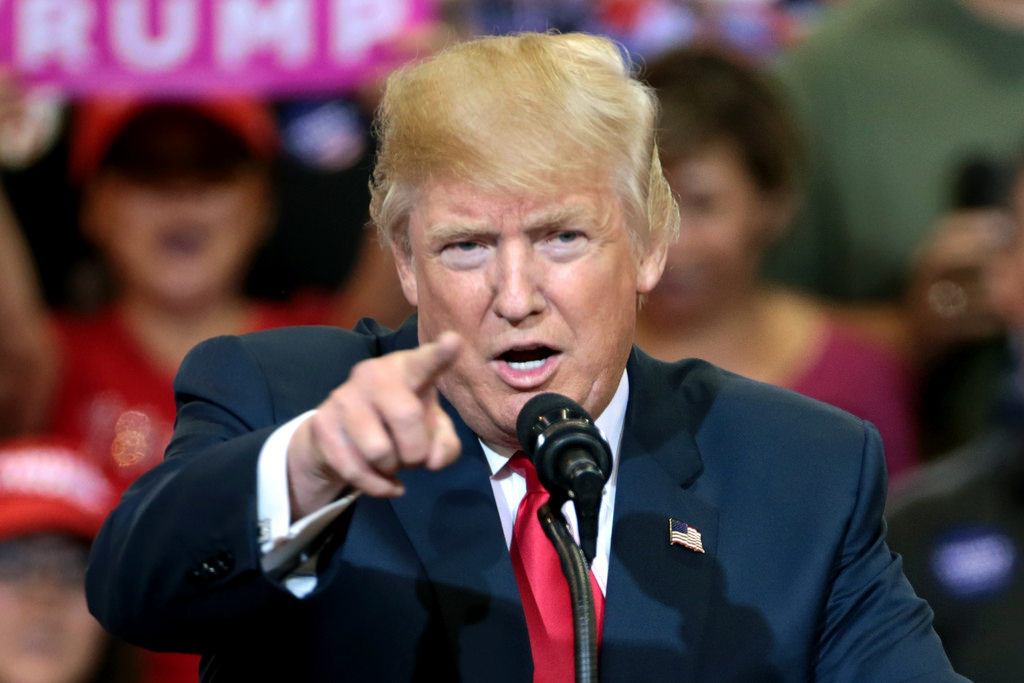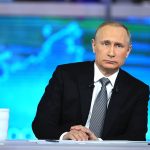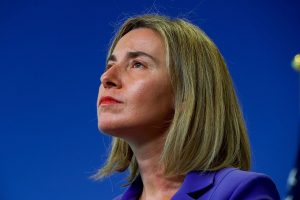by Robert E. Hunter
Words matter. This is especially so when uttered by the president of the United States on foreign policy and national security and with an attentive foreign audience.
As in ordinary life, some things, once said, can’t be unsaid.
Donald J. Trump has yet to learn that lesson.
In the United States, we have a statute of limitations on words uttered in a political campaign. Candidates can say just about anything to be elected and have done so since the founding of the Republic. So what? After the votes are counted, the election is over and done with and everyone starts out fresh. But because of the character of this year’s winning candidate for president and his logorrhea on his Twitter account, most of us have found it necessary to extend the statute until high noon on January 20.
Not so for people abroad. What Trump has already said in this traditional interregnum of political and policy statements will impact his presidency far more than he could possibly have intended.
In an interview with the Times of London and another tabloid, Bild, in Germany, Trump managed to make policy before he is sworn in that will bind what he does as president. It’s not because his words have been chiseled in stone or been brought down on tablets from Mt. Sinai, but because they are taken seriously by foreign observers who in some cases will act upon them.
Undermining NATO
A bedrock of the US role in the world and of US security is America’s relationship with its North Atlantic allies and partners. This is a sine qua non for enabling the United States to take full advantage of having two broad oceans and complaisant near-neighbors.
Trump obviously doesn’t yet understand that fact, or at least he doesn’t understand how skittish his words—however intended, however much taken out of context, however over-amplified—will make others feel, especially others who depend on the United States of America to get at least some things right.
The president-elect has said more than once that the North Atlantic Treaty Organization is “obsolete.” He didn’t say that “it needs reform,” a formulation that would at least be open to debate. Nor did he limit himself to saying that NATO needs to get actively involved, as an alliance, in the fight against Islamist terrorism and particularly the Islamic State. There is a solid case for its doing so. No, he said that NATO is “obsolete.” It mattered little that in his Times/Bild interview he added: “With that being said, NATO is very important to me.” The damage was done.
Even as a person who prides himself on having broken more crockery than any other successful presidential candidate in modern times, Trump has to know how much of the apparatus of peace and security depends on keeping NATO sacrosanct, not just for the United States and its allies but for other countries farther afield, both friend and foe. The ritual has to be observed, like the repetition of eight or nine items of litany that every president and aspirant to that office must say to reassure Israel of U.S. commitment to its survival.
By what Trump has said and, perhaps even more, how he has said it, he has raised doubts about his personal commitment to NATO and its core mutual defense pledge that all 28 countries make to one another. Doubts are the enemy of security.
He has again pressed allies to pay their fair share of NATO expenses. There is nothing wrong with that. It has also been the policy, in one form or another, of every US administration since the alliance was founded. It was last reiterated by the Obama administration in the form of a commitment by each ally to spend at least 2% of its GDP on defense.
It isn’t the policy that is wrong in Trump’s commentary. It is the way he has said it. During the campaign, he refused to answer directly that the United States would defend the Baltic countries, members of NATO, against attack by Russia, come what may. He said he would first look at whether they were paying their bills. Is it a good idea for them and others to pony up, in particular to show Congress and the American people that they are not getting a free ride at the US taxpayers’ expense? Of course. But to link in the same sentence the two ideas—money and defense—has to be a no-no. He said something similar in his Times/Bild interview this week, in effect telling the allies that his “campaign mode” regarding the alliance could also be his “governing mode.” In military parlance, this is called “shooting oneself in the foot.”
Disparaging the EU
Then Trump punched another tar baby by blessing the United Kingdom’s leaving the European Union, known in shorthand as Brexit. He threw a life preserver to the British prime minister, who is almost drowning in the implications of what the British have (imprudently) decided to do—the equivalent on the other side of the Atlantic of the turmoil that Trump has provoked in the alliance as a whole. He proposes to sign a trade pact with Britain, thus helping to widen even further the breach between Britain and the EU, which will have a profound impact on the UK’s entire role in Europe—political and security as well as economic—and on efforts by allied countries to fend off threats from Vladimir Putin’s Russia. Trump then made his solecism even worse by predicting that other countries would leave the EU, thus portending the collapse of a 70-year effort to write finis to conflict on the European continent that has been a rock-solid policy of the United States since the 1940s.
As if matters could not have become worse, Trump directly took on the German federal chancellor, Angela Merkel, who leads a country without whose close alliance the United States might just as well not have a political, economic, and security relationship with the EU and Western Europe. He said that her decision to take in about a million refugees from the Middle East and North Africa was “catastrophic.” That may in fact be so; it certainly did not help Germany or any other country facing an anti-immigrant backlash that is even more intense than here in the United States. But in a relationship that one hopes will survive, such as that between the US and Germany, when you need the other partner for your own well-being, there are some things you never, ever say, however true. You keep your trap shut.
As he gazes at the refugee travails of European allies and partners, Trump seems not to know that it is taking place because of things the United States has done. It is not just the policies practiced by the present administration in regard to Syria and Libya, which have certainly swelled the flood of refugees, not to the United States but to Europe. It’s also the policies of the last Republican administration, which invaded Iraq in the first place and ripped apart the fragile fabric of relative regional quiet. “Physician, heal thyself,” Merkel could say to Mr. Trump, if she had as little control over her tongue as he does.
The Russian Question Mark
All this takes place against the backdrop of Russian President Vladimir Putin’s designs not just for his country and its place in the world, but also toward other parts of Europe. A good case can be made that his aggression against Crimea and his pressure on NATO allies in Central Europe did not come out of the clear blue sky. George H.W. Bush set as a grand strategy the creation of a “Europe whole and free and at peace.” To try forestalling Russian revanchism after the Soviet Union lost the Cold War and thus to avoid repetition of Adolf Hitler’s rise following the punitive provisions of the Treaty of Versailles, Bush included Russia in his vision. So did Bill Clinton, at least until the latter part of his administration. But since then, the United States forgot the lesson put forward by the elder Bush and in practice has isolated, excluded, and “disrespected” Russia. The list of “unforced errors” by the US is long, including pledges to bring Georgia and Ukraine into NATO, which Putin used to tell his people that the United States is trying to “surround Russia.” As recently as last year, despite all the threats to European security following Russian military actions in Ukraine, the US got NATO to re-endorse the pledge of membership for Georgia.
Because of the Obama administration’s actions regarding Syria, there may be a greater need for the United States to try creating a modus vivendi with Russia. But it should not come at the expense of US allies and partners. As a result of President Obama letting not U.S. interests but regional states like the Gulf States, Israel, and Turkey dictate US policy, Russia now has a foothold in the Middle East that it has not had since Egypt’s president, Anwar Sadat, expelled Soviet military advisers four decades ago.
Perhaps Trump is trying to revert to the original intent of including Russia in the “Europe whole.” Maybe he is just trying to set up the possibilities of a deal with Putin, based both on the needs of overarching security in Europe, including security for all NATO allies, and on realities. Trump did link a lifting of sanctions to further cuts in nuclear arms by the two countries, the latter a US goal for many years. Trump has not, however, dispelled perceptions that he’s Putin’s potential dupe.
Trump’s stance toward Russia is in significant part a product of the shock of his electoral victory to the Washington establishment. Surely he didn’t win fairly and his presidency will thus be illegitimate. Surely he would not be president-elect if the FBI director had not jumped into the fray and if the Russians had not hacked into emails from the Democratic National Committee and the Hillary Clinton campaign—the damning content of those emails be damned! For so much of the mainstream media, the pundit class, and the Washington think-tank community, which had their collective hearts set on a Clinton victory despite a deeply flawed political campaign, there must be a bogeyman. Vladimir Putin and his putative bromance with Trump fill the bill. (Following the Times/Bild interview, the US mainstream media blew many of Trump’s comments way out of proportion—but that’s life in the big time! )
“Life isn’t fair,” John F. Kennedy intoned. In some ways, Trump is getting pummeled, at home and abroad, for how he has said things as much as for some of the ideas he is pushing. But that is the real world in which he must live.
The statute of limitations on his tweets should have run out months ago. It will definitely run out for good this Friday. Self-control is one of the irreducible demands placed on the president of the United States.
Words count. Let’s see if the new president can learn this lesson before his words cause irreparable harm.
Photo of Donald Trump by Gage Skidmore via Flickr.






Astonishing recklessness on the part of Donald Trump. Clearly a very dangerous ignoramus.
Congratulations America you have elected an uncouth, narcissistic, vindictive, egomaniac for a president. He is probably the most thin skinned president ever, who must personally respond to every slight (real or perceived). His only concern is I, me and my, national interest, diplomatic protocol, morale of his civil service, truth and ethical conduct all be damned.
“A good case can be made that his aggression against Crimea and his pressure on NATO allies in Central Europe ” No it cannot. A good case can be made that the USA is the one doing the interference,and has done its best to destroy the Russia emerging from the old USSR-helping elect the drunken Yeltsin, aiding the oligarchs, enlarging NATO when it should have been abandoned after the “communist menace” was gone.Encircling Russia with bases right through the Clinton, WBush and Obama years then blaming Russia for the farce of a US election contested by two atrocious candidates, one of whom who needed no help to lose to a demagogue fixated on lying his way to power.
I agree with Ray McGovern ( retired CIA analyst) and Col Lawrence Wilkerson (former chief of staff for Colin Powell). NATO needs to cease being aggressive.
NATO was created as a counter to the vast military might that the USSR possessed in the immediate post-ww2 era.
For as long as the USSR existed, and for as long as it could field a vast military force then, yes, NATO made sense.
But the USSR is long gone, and with it went that vast army.
What remains is Russia as a middling economic power and with a credible armed forces with severely limited force-projection capabilities.
Heck, France + Germany + Britain overwhelmingly outspend the Russians in terms of military expenditure.
There. Is. No. Reason. For. NATO. To. Exist.
None. Zip. Zero.
Here is a simple thought experiment: if Trump pulled the USA out of NATO would Britain or France or Germany feel compelled to increase their own military spending?
I would doubt it very much, precisely because they face no threat and haven’t since the USSR imploded.
This is what American officials simply can’t comprehend: the Europeans spend what the have to spend, and not a euro more.
Which since 1991 amounts to about… oh… 2% of GDP.
They won’t spend any more no matter what the Americans do/don’t. After all, why should they?